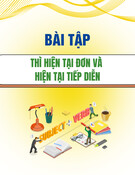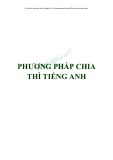
LESSON 1 :TENSES ( Caùc thì )
1. SIMPLE PRESENT: (HTÑ)
Affir : S+V
1 /Vs, es Ex : Water boils at 100
o c.
Neg: S+ do/ does +
not+ V1
Ex : Tom doesn’t feel hungry.
Inter: Do/ does+ S + V 1
…?
Ex : How often do you go to school?
*(Be):am, is, are not ; (have):has/ have not +got = do / does + not + have
Dieãn taû : Tình caûm, caûm giaùc, nhaän thöùc ôû hñoäng.
Thoùi quen, phong tuïc, taäp quaùn.
Chaân lí, söï thaät hieån nhieân.
Vôùi : EVERY (day, year…), ALWAYS, OFTEN, USUALLY, SOMETIME, SELDOM, RARELY,
NEVER, EVER, ONCE / TWICE / THREE TIMES + ( a day/ week/ month…), all the time, now
and then . . ..
Notes : Qui taéc theâm es ñoái vôùi ñoäng töø coù S soá ít :
- Caùc ñoäng töø taän cuøng laø : o, sh, ch, x, s, vaø z .
- Caùc ñoäng töø taän cuøng laø y maø ñöùng tröôùc y laø moät phuï aâm ta ñoåi y
i + es
( She studies, Tom tries, He plays . . .).
2. PRESENT CONTINUOUS ( HTTD)
S + am/ is/ are + V
ing Ex: We are studying English now.
S + am/ is/ are + not
+ Ving
Ex: She isn’t writing when he
comes.
Am/ Is/ Are + S + Ving
?
Ex: What are you doing while I am
doing?
Dieãn taû : Hñoäng ñang xaûy ra ôû Htaïi vaøo luùc noùi vieát.
2 hñoäng ñang keùo daøi // ôû Htaïi (while: trong khi).
1 hñoäng ñang keùo daøi ôû Htaïi thì coù 1 hñoäng ngaén ñoät
ngoät xaûy ra(S+ V1/ Vs, es)
Vôùi : AT PRESENT , AT THE MOMENT , NOW, RIGHT NOW, JUST NOW, !,…
3. PRESENT PERFECT: (HTHT)
S + has/ have + V
3ed Ex: I’ve just opened the door.
Ex: We have studied English for many
years.
S + has/ have + not
+ V3ed
Ex: Jack hasn’t come recently.
Has/ Have + S + V3ed? Ex: How long have you studied
English?
1

Dieãn taû: Hñoäng Qk ko roõ tg.
Hñoäng vöøa môùi xaûy ra.
Hñoäng baét ñaàu trong Qk, vaãn coøn tieáp tuïc ôû Htaïi & coù
theå tieáp tuïc ôû Tlai.
Vôùi: BEFORE, ALREADY, RECENTLY= LATELY, EVER, NEVER, YET , JUST, TWICE,
SEVERAL TIMES, SINCE + moác TG, FOR + khoaûng TG, UP TO NOW=UP TILL NOW=SO
FAR…
4. PRESENT PERFECT CONTINUOUS: (HTHTTD)
S + has/ have + been + V
ing. Ex: We have been studying English for
many years.
S + has/ have + not + been
+ Ving.
Has/ Have + S + been +
Ving?
Dieãn taû: - Hñoäng baét ñaàu trong Qkhöù, tieáp tuïc ôû Htaïi & coù theå
( nhaán maïnh tính lieân tuïc) - since + moác TG ; for + khoaûng TG.
5. SIMPLE PAST (QKÑ)
S + V
2ed Ex: I saw him yesterday.
S + did + not
+ V1
Ex: She didn’t come last week.
Did + S + V1 ? Ex: Did Mr. Lee phone an hour
ago?
*(Be) : was / were wasn’t, weren’t
Dieãn taû: - Hñoäng ñaõ xaûy ra & chaám döùt hoaøn toaøn trong Qk ( xaùc
Vôùi: - YESTERDAY, AGO ,LAST (night, week, year…)
6. PAST CONTINUOUS (QKTD)
S + was/ were + Ving Ex: We were watching TV at 7 pm yesterday.
S + was/ were + not + Ving Ex:I was writing while my father was reading.
Was / were + S + Ving ? Ex: She was sleeping as the telephone rang.
Dieãn taû: Hñoäng xaûy ra ôû 1 giôø / khoaûng giôø Qk xaùc ñònh ( at 7pm, from 6 to 7, …)
2 hñoäng dieãn ra // ôû Qk. (while: trong khi)
1 hñoäng Qk ñang keùo daøi thì 1 hñ ngaén ñngoät xaûy ra (S + V
2ed)
Vôùi: AT THAT TIME, AT THAT MOMENT…
7. PAST PERFECT (QKTD)
S + had + V
3ed Ex: Last night I went to bed after I dad done my
homework.
S + had + not +
V3ed
2

Had + S + V3ed ?
Dieãn taû: - Hñoäng xaûy ra tröôùc 1 moác TG ôû Qk hoaëc tröôùc 1 hñ Qk
Vôùi : ( tröôùc: S+ had +V3ed ; sau: S + V2)
8. SIMPLE FUTURE (TLÑ)
S + will / shall + V
1Ex: I’ll buy it
tomorrow.
S + will / shall + not +
V1
Will / Shall + S + V1?
*Note: will not =won’t ; shall not =shan’t.
Dieãn taû: Hñ seõ xaûy ra trong tlai.
Lôøi yeâu caàu (Will you + V1…? ); Ñeà nghò ( Shall I / we
Vôùi: TOMORROW, SOON, NEXT (week, month,…)
9. FUTURE PERFECT (TLHT)
S + will / shall + have + V
3ed .
Ex: We’ll have already finished the work by the time you get back
Dieãn taû: Hñoäng seõ hoaøn taát trong tlai.
* Notes:
1) Near future: (Tlai gaàn) S + am/ is / are + going to + V1 : seõ, saép söûa, döï ñònh…
Ex: I’m going to buy it tomorrow.
2)Moät soá ñoäng töø sau ñaây thöôøng khoâng duøng vôùi thì tieáp dieãn
Be : Ex: I am a student now.
Nhöõng ñoäng töø chæ veà giaùc quan: see, hear, feel, look (troâng coù veû), smell, taste, recognize.
Nhöõng ñoäng töø chæ veà caûm xuùc: like, dislike love, hate, want wish, desire, refuse, forgive.
Nhöõng ñoäng töø chæ veà lí trí: understand, know, think, realize, suppose, believe, remember,
forget, mind, expect, recollect.
Nhöõng ñoäng töø chæ söï baét ñaàu, tieáp tuïc, keát thuùc: begin, continue, finish…
LESSON 2: PREPOSITIONS ( Giôùi töø)
A. COMMON PREPOSITION:
I. Prep. Of Place:
1. IN: ôû trong ( 1 nôi/ vuøng/ khu vöïc/ quoác gia/ thaønh phoá/ …)
Ex: in the room/ Asia/ Britain/ London/ …
in bed/ newspaper/ magazines/ the world/…
2. ON: ôû treân
Ex: on the table/ the board/ the floor/ …
on TV/ the radio/ telephone/ the way/ the street/ horse back/ …
3. AT : ôû taïi (ñòa ñieåm nhoû).
Ex: at the desk/ the station/ the airport/ 72 Pham Ngu Lao street….
3

at home/ school/ work…
4. FROM : töø (nôi xuaát phaùt). Ex: Mr. Mac Donald is from Scotland.
5. TO: ñeán (ñích) . Ex: Elizabeth went to the store.
6. BETWEEN : ôû giöõa (2 ngöôøi / vaät). Ex: Mai is sitting between Nam and Nga.
7. AMONG: ôû giöõa , trong soá Ex : The letter is somewhere among these papers.
II. Prep. Of Time
1. IN: 1977( 1890, 2008…)
the summer (winter…)
April (May, August…)
the morning (afternoon, evening…)
time: kòp luùc
an hour - Ex : I will arrive in an hour.
4

2. ON : holiday
weekend
Monday
15, October
October 15
th 1977
Monday morning
Christmas day
time : ñuùng luùc
fire : ñang chaùy
3. AT: 7 o’clock
night
midnight
noon
(the) weekend
Christmas
the end of
the moment
4. SINCE (+ moác TG): keå töø … Ex: He has studied English since 1900.
5. FOR (+ 1 khoaûng TG) : ñöôïc… Ex: _________________ for 17 years
6. FROM: töø
7. TO : ñeán Ex: I lived in village from 1977 to 1992.
III. Some Other Prep. :
1. By : baèng ,bôûi. Ex: They can enrich the soil by using fertilizers.
* by bus/ car/ train/ plane/ …
2. On foot: ñi boä
3. For : cho , vì, ñeå (chæ muïc ñích) . Ex: What would you like for breakfast?
Ex: Some people read for pleasure.
4. With : vôùi , baèng. Ex: He went with her.
Ex: I can write better with my own pen.
5. About : veà. Ex: What do you think about her?
6. Of : cuûa. Ex: The window of the living room.
B. PREPOSITIONS FOLLOWING ADJECTIVES:
1. Adj + TO : acceptable, accustomed, agreeable, contrary, harmful, important,
kind, likely, lucky, open, pleasant, similar, familiar, helpful, (but: it’s very kind of you.)
2. Adj + IN : interested, rich, successful
3. Adj + OF : afraid, ahead, aware, capable,confident, full, tired, sure, proud
4. Adj + FOR : available, difficult, late, perfect, useful, famous, responsible, sorry (S.O)
5. Adj + FROM : absent, different, safe, far
6. Adj + AT : clever, present, quick, skilful, good, bad, (angry at something/ with someone)
7. Adj + WITH : acquainted, crowed, friendly, popular, busy, bored, pleased, fed up
8. Adj + ABOUT : confused, sad, serious, worried, sorry (S.T)
5

![Ôn tập các thì trong tiếng Anh [chuẩn nhất]](https://cdn.tailieu.vn/images/document/thumbnail/2019/20190920/vuvan153/135x160/1989489814.jpg)







![Các thì tiếng Anh thông dụng [2024]: Tổng hợp đầy đủ nhất](https://cdn.tailieu.vn/images/document/thumbnail/2016/20160527/thongnguyentrung/135x160/541885747.jpg)


![Bài tập thì hiện tại hoàn thành [kèm đáp án chi tiết]](https://cdn.tailieu.vn/images/document/thumbnail/2025/20251106/thuthao27062004/135x160/41601762420911.jpg)






![Tài liệu ôn tập Ngữ pháp tiếng Anh [chuẩn/mới nhất/tổng hợp]](https://cdn.tailieu.vn/images/document/thumbnail/2025/20250821/vuongdinhlinh1412@gmail.com/135x160/933_tai-lieu-on-tap-ngu-phap-tieng-anh.jpg)

![Bài tập so sánh hơn và so sánh nhất của tính từ [kèm đáp án/mới nhất]](https://cdn.tailieu.vn/images/document/thumbnail/2025/20250808/nhatlinhluong27@gmail.com/135x160/77671754900604.jpg)




